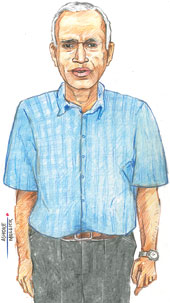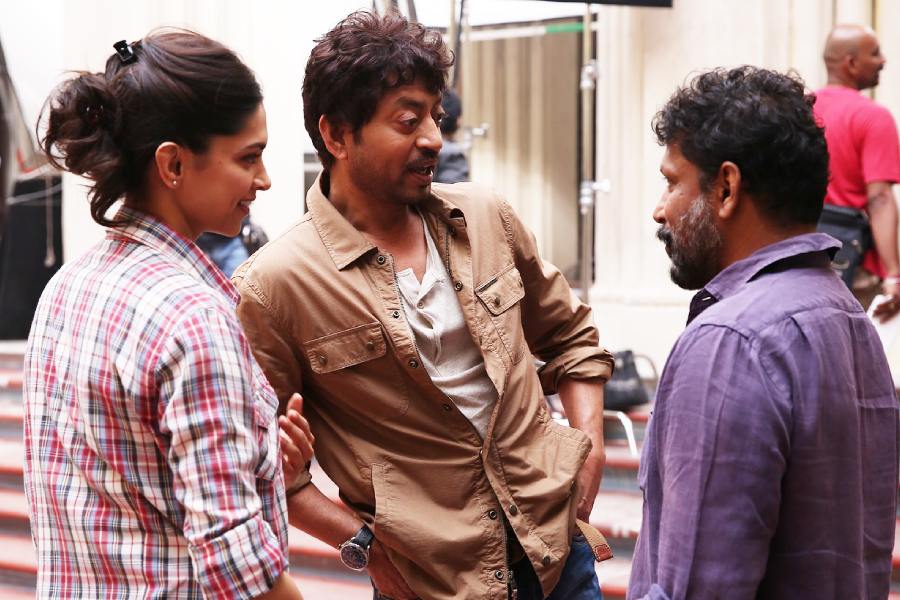 |
It’s a five-and-a-half minute clip on the popular video-sharing website YouTube. Dressed in a red ghagra-choli and a headscarf, the performer is sashaying away to Piya tu ab toh aaja, a Helen dance that would now be called an item song and was known as a cabaret number back in the Seventies. It’s only when you see a furry belly that you realise the dancer is not a nubile nymphet.
It is actually Manil Suri. The writer had done the Helen act when he was challenged to do something embarrassing after a reading at the Brooklyn Book Festival in 2008. Last checked, the video had some 7,075 hits.
The image is overpowering as I walk up to him for an interview. And I am still thinking of the gyrating figure when he suddenly surprises me with a power-point presentation. I should have remembered that Suri is a mathematician first and then an author. So he tells, with the help of figures and visuals, the number of words he wrote and the number of pages he tore every day. “I used only two sentences of the 200 pages that I wrote in a year,” he says.
Suri is talking about his new book The City of Devi. Published by Bloomsbury in India, it’s the final part of his Trinity trilogy. The story is set in Mumbai which is under the threat of a nuclear attack from Pakistan. Residents are leaving the city and Muslims are being harassed by the cops. In the middle of this, a wife is looking for her husband.
He shows me a maze in which the three protagonists are in different corners, a pomegranate lies somewhere in between, and a jar of marmalade is placed elsewhere. In the 10-minute long presentation, different images spring up from different corners and the story progresses.
“I do not simply write a novel. For me everything has to proceed like mathematical proof,” Suri says. He has now shut his Sony laptop and looks at me expectantly for the questions.
We start with the title of the book. “Yes, after my books on Vishnu and Shiva, this book should have had Brahma in it, isn’t that so,” asks the Indian-American author. “That’s the Trinity, right? But I started seeing Devi in this book. And I started seeing everything with the number three,” explains Suri. “I got stuck on the number. This is my third book, it has three main characters, and three countries (India, Pakistan and China) are a part of the story. And for me the Trinity could be completed only with Devi in it.”
His first novel, The Death of Vishnu, published in 2001, was one of the finalists for the PEN/Faulkner award and made it to the Booker Prize longlist that year. The protagonist of the book, Vishnu, runs errands for the residents of a housing society in Mumbai. In his last days, he considers himself an avatar of his namesake. The plot also beautifully weaves in Hindu-Muslim relations in a middle-class housing society. It shows a slice of life — the sharing of kitchens and toilets and the love affairs on the building terraces, for instance — of another time.
“But that’s how I grew up. I was the only child of my parents. We stayed in a rented accommodation in Mumbai where we shared our kitchen and toilet with three other families,” says Suri. “Those days being good in academics meant opting for science but I had no love for biology. Initially I opted for physics, but later switched to mathematics in my second year of graduation.” He finished his graduation from Jai Hind College in Mumbai.
As a young lad, he spent his days watching Hindi films. His father was an assistant music director to Bollywood composers Madan Mohan and Laxmikant Pyarelal. “As a child, I loved Hindi films and painting Bollywood posters was my hobby,” he says. His mother, who worked as one of the secretaries to Indira Gandhi, gave up work after his birth and much later started teaching.
The boy who hated biology (and was not fond of chemistry either) but loved Bollywood now teaches mathematics at the University of Maryland, Baltimore, in the US. “I joined this university after finishing my PhD from Carnegie Mellon University. I never moved out, and have been teaching the subject for 30 years now,” says Suri, 53.
And while teaching, he has been indulging his passion for writing. “I started writing when I was 25. I had written a short story which got a rejection letter and was followed by a few hundred such letters whenever I wrote something. Then in 1994, when I was visiting India, this man named Vishnu, who lived in our apartment complex, died. It gave birth to The Death of Vishnu which I started writing in 1995 and finally finished in 2000,” he says.
Suri admits he is a slow writer. His second book The Age of Shiva was written in seven years. And his latest took almost 12 years before it reached the publisher’s desk.
“Looking at my life expectancy and the pace at which I write,” he says laughing, “I might pen three more books.” He has already decided upon two of the subjects. “One would be a completely mathematical novel, another one a non-fictional work on my mother’s life.”
Suri is a bit of an enigma. He is dressed very smartly — and doesn’t quite fit into your idea of a mathematics professor, whom you’d expect to see in frayed tweeds. He is in a blue blazer that goes well with his white shirt, black trousers and polished shoes. He has a finely chiselled face, with hair that’s more salt than pepper, and a quiet sense of humour.
He is also the first writer I’ve met who’s not sure what his first published work was. “It’s hilarious,” he chuckles, “At a writing group someone said he wanted to publish a short story I had written in his Bulgarian journal. A year later I receive this Bulgarian journal at home but since I don’t know the language I couldn’t read a word. So I am not completely sure whether my story got published or not.”
By his own admission he trained hard to become a writer. He attended several writing workshops to hone his skills. And some were even secret workshops. “I was living in Baltimore and got to know of a writing workshop in Washington which had bizarre admission criteria: only coloured people, or from third world countries, or those who were gay or lesbian could apply to the writing school. Oddly enough, I fitted into all the three categories,” he says with a wry smile.
We haven’t yet talked about his sexuality. In a country where being a homosexual is still not talked about in the open, Suri has no qualms referring to his sexual orientation. “It wasn’t easy speaking about my sexuality with my parents. I was visiting India in 1981 and was by then in a six-year relationship with a man. I first confided in my mother and the fact that she had studied psychology helped matters. But my father came to know only a decade later.” Today, Suri is in a committed relationship, having spent 23 years with his American partner who works as an engineer.
We get back to his writing days. Several writing workshops later and a decade and half after he wrote his first short story, Suri tasted success when an extract from The Death of Vishnu was published in the New Yorker. “It was a big thing. Once that happened, I soon got an international publisher through an auction bid.”
Suri announced that he would do a trilogy. His acquaintances expected him to quit teaching to concentrate on his writing career. “The more people asked me about the second book, the worse it got. So I took a few months off from the classroom to write but it turned out to be a disaster. I realised I am not made to be just a writer. I realised that teaching helped me develop stories.” Suri soon went back to the university and now devotes two days in a week to writing.
This is also the first time that one of the leading characters in his book is gay. He was worried that the character could look autobiographical to readers and wanted to tone down the dark shades attached to the subject. “In The City of Devi, the character of Jazz got me anxious. Jazz was gay and was having too much sex. I worried whether people would think I was like Jazz. I wondered what my students would make of Jazz’s character,” he says. But soon the voices of dissent in his head disappeared. “I made up my mind that I have to be fearless in my writing.”
He’s been talking for an hour now. The quiet corner of the terrace at the Diggi Palace that we occupied is now buzzing with activity. As he gets up to leave, I quickly ask him about the Helen act.
“The challenge was to do something you haven’t done before. This was announced a year in advance. I prepared hard, came to India, picked up my costumes and took dance lessons. When I walked on to the stage I was petrified. But then I let myself go. It was the most liberating thing to do. This was the act that gave me courage to bring out the character of Jazz.”
Dance it again, Jazz!










